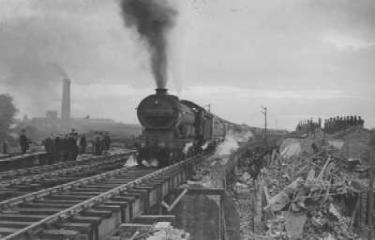| On the night of the 13th June 1944 Londoners heard a strange sound in the sky. The sound was later described as sounding like a motorbike without a silencer or a badly maintained steam train going up hill. Some also saw, what they thought was a burning enemy aircraft crossing the sky with a sword of flame emanating from its tail. Others knew that this was the first of the Vengeance weapons code named "Diver " by British Intelligence |
| The first V1 to hit London |

| 13th June 1944 |
| horrors during the Blitz of 1940 -41. Since then,bombing had become much February 1944 there were a series of attacks which caused further damage and death in London. These are known as the mini blitz .They were not on the scale of the main 1940-41 Blitz but still caused further death,suffering and material damage. After D day there was great relief and an expectation that the war would be over very quickly There had been rumours for some time about Hitler's secret weapons but these were taken as a joke and civilians did not believe that there was a serious threat. It was a cold, damp, grey summer and the days following the Normandy landings were marked by the severest summer storms that anyone could remember. The greyness of the summer accentuated the mood. Fatigue after five long years of war, deprivation, rationing and suffering. Londoners were desperate for the war to be over but had no idea that they would shortly be in the front line again. They thought that their part of the war at the home front was finished. On the night of the 13th June 1944 Londoners heard a strange sound in the sky. The sound was later described as sounding like a motorbike without a silencer or a badly maintained steam train going up hill. Some also saw, what they thought was a burning enemy aircraft crossing the sky with a sword of flame emanating from its tail. Others knew that this was the first of the Vengeance weapons code named "Diver " by British Intelligence. For a year Bomber command had been engaged in a campaign to destroy the V1 launch sites in Northern France. This met with a great deal of success and had delayed the launch of the first missile by about 6 months. This was at the cost of the lives of 2000 allied airmen. The first V1 dived to the ground and exploded in Grove Road,London E4 at 04.25 on the morning of 13th June 1944. It hit the railway bridge which carries the Great Eastern Railway across Grove Road, from Liverpool street to Essex and East Anglia. The bridge was badly damaged, as was the railway track. A number of houses were demolished and six people were killed. London had its first taste of what a V1 could do. he Grove Road V1 was one of five launched that night which were probably a range finding exercise by the Germans. After that nothing much happened for about 48 hours as the next wave of the attack was prepared. |







